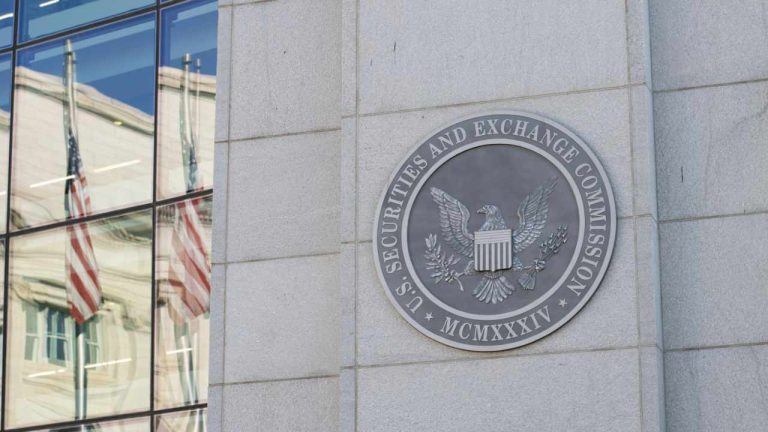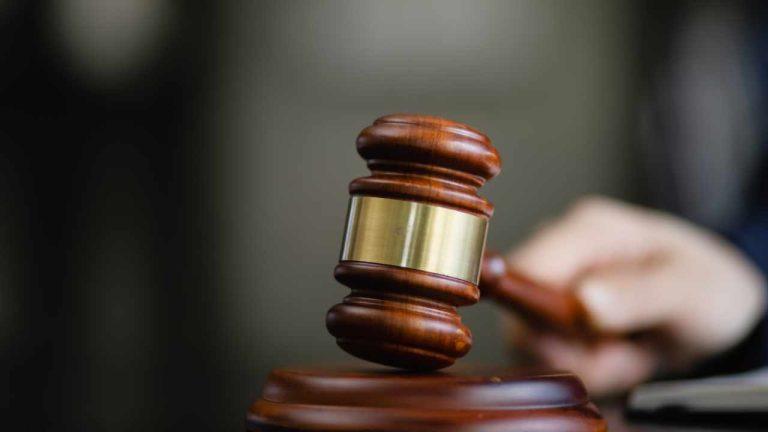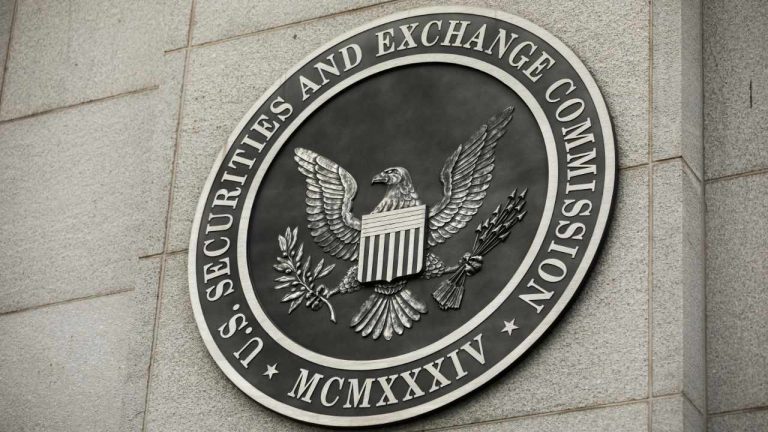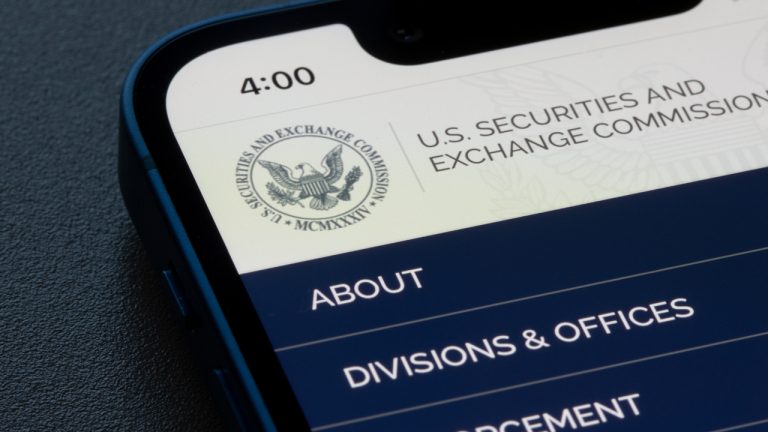 Ripple’s chief legal officer says he wouldn’t be surprised if the U.S. Securities and Exchange Commission (SEC) does appeal the final ruling in the Ripple lawsuit over XRP. He questioned the SEC’s rationality and expressed confidence that any appeal by the SEC would likely fail. Alderoty urged the SEC to focus on its core mission […]
Ripple’s chief legal officer says he wouldn’t be surprised if the U.S. Securities and Exchange Commission (SEC) does appeal the final ruling in the Ripple lawsuit over XRP. He questioned the SEC’s rationality and expressed confidence that any appeal by the SEC would likely fail. Alderoty urged the SEC to focus on its core mission […] A U.S. district court has ordered FTX and Alameda Research to pay $12.7 billion to fraud victims due to their misuse of customer funds and fraudulent practices. Ian McGinley, Director of the Commodity Futures Trading Commission’s Division of Enforcement, emphasized that this multibillion-dollar recovery is the largest recovery in CFTC history. FTX and Alameda Ordered […]
A U.S. district court has ordered FTX and Alameda Research to pay $12.7 billion to fraud victims due to their misuse of customer funds and fraudulent practices. Ian McGinley, Director of the Commodity Futures Trading Commission’s Division of Enforcement, emphasized that this multibillion-dollar recovery is the largest recovery in CFTC history. FTX and Alameda Ordered […] Coinbase’s chief legal officer has publicly urged U.S. Securities and Exchange Commission (SEC) Chair Gary Gensler to stop misleading the market regarding crypto tokens being securities. His request followed Gensler’s repeated assertions that numerous crypto tokens conform to the legal definition of securities, thereby requiring compliance with SEC regulations. Coinbase’s CLO to Gensler: Please Stop […]
Coinbase’s chief legal officer has publicly urged U.S. Securities and Exchange Commission (SEC) Chair Gary Gensler to stop misleading the market regarding crypto tokens being securities. His request followed Gensler’s repeated assertions that numerous crypto tokens conform to the legal definition of securities, thereby requiring compliance with SEC regulations. Coinbase’s CLO to Gensler: Please Stop […] Global investment bank JPMorgan anticipates that the U.S. Securities and Exchange Commission (SEC) will eventually approve spot ether exchange-traded funds (ETFs). However, the firm pegs the chance of approval in May at 50%, foreseeing a potential litigation process if an ether ETF application is rejected at that time. JPMorgan on Potential SEC Approval of Spot […]
Global investment bank JPMorgan anticipates that the U.S. Securities and Exchange Commission (SEC) will eventually approve spot ether exchange-traded funds (ETFs). However, the firm pegs the chance of approval in May at 50%, foreseeing a potential litigation process if an ether ETF application is rejected at that time. JPMorgan on Potential SEC Approval of Spot […]
The regulator stepped up enforcement actions in the crypto space following the revelations that took place around FTX.
Cryptocurrency-related enforcement actions undertaken by the United States securities regulator significantly increased in the six months following the bankruptcy of cryptocurrency exchange FTX.
An analysis of press releases from the Securities and Exchange Commission (SEC) and news reports on its actions found that in the six months preceding FTX’s collapse — the SEC undertook approximately six enforcement actions.
In the six months after FTX’s bankruptcy on Nov. 11, 2022, SEC crypto-related enforcement actions jumped to at least 17, an estimated increase of 183% from the preceding period.

The analysis doesn’t account for the two recent lawsuits the SEC brought against Binance on June 5 and Coinbase a day later.
The increased actions, including the recent ones taken against the two exchanges, has seen some observers suggesting the SEC is attempting to redeem itself for failing to police FTX.
On June 7, MarketWatch reported that Republican Representative French Hill said the recent crackdown was a “cover your ass” move from the regulator and SEC chair Gary Gensler. He was speaking at an event in Washington D.C. that day.
Let’s talk crypto. @RepFrenchHill says to Peter Roskam and Heath Shuler that bipartisanship played a huge role in drafting stablecoin legislation. #BHLegSem23 #BHEvents #Congress pic.twitter.com/D3B60qNgpS
— BakerHostetler (@BakerHostetler) June 7, 2023
Hill claimed instead of Gensler “overseeing FTX” the SEC head was instead “out bashing Kim Kardashian because she’s promoted crypto on some Super Bowl ad,” and said:
“[Gensler] opened up this year, in 2023, with all these enforcement actions, I think it looks like [cover your ass] to me.”
Markus Thielen, the head of research and strategy at Matrixport and author of Crypto Titans previously told Cointelegraph he believes there’s an air of “embarrassment” for those who didn’t catch the issues at FTX.
Related: SEC lawsuits: 67 cryptocurrencies are now seen as securities by the SEC
Ripple CEO Brad Garlinghouse echoed the sentiment, claiming in a June 6 tweet that the SEC is “throwing lawsuits at the wall and hoping they distract from the agency’s FTX debacle.”
Hall of Flame: Crypto Wendy on trashing the SEC, sexism, and how underdogs can win

The Coinbase CEO has a lot of faith in Congress in making a “clear rule book” for crypto firms to follow. But the SEC? Not so much.
United States-founded cryptocurrency exchange Coinbase has no plans to move its operations out of the U.S., CEO Brian Armstrong told investors in an Q1 earnings call.
On May 5, Armstrong assured shareholders the firm is “100% committed” to the U.S. market over the long term despite regulatory uncertainty in the U.S.
“So let me be clear, we're 100% committed to the U.S. I founded this company in the United States because I saw that rule of law prevails here. That's really important, and I'm actually really optimistic on the U.S. getting this right.”
The “optimism” alluded to by Armstrong comes from his confidence in Congress soon passing a clear set of rules for crypto firms to follow:
“When I go visit DC, there is strong bipartisan support for Congress to come in and create new legislation that would create a clear rule book in the U.S. and I think it's really important for America to get this right.”
However, Armstrong’s comments weren’t entirely “optimistic.”
The chief executive is concerned about the unpredictable enforcement action of the Securities Exchange Commission, which comes in light of the firm being served with a Wells Notice by the securities regulator in late March:
“Despite our ongoing engagement with the commission, they have not been as clear about what their specific concerns are with Coinbase as we might like, and so I have to refrain from speculating too much.”
“It's especially difficult to predict the timeline of any potential SEC litigation that we might face,” Armstrong added.
The troubles led Coinbase to file an action in a U.S. federal court seeking to compel the SEC to answer a petition that has been pending since July.
Today, to provide greater transparency in our long-standing engagement with the SEC, we are sharing our response to the Wells notice we received last month. https://t.co/aquuWmxmRM
— Coinbase ️ (@coinbase) April 27, 2023
The back and forth comes as Coinbase launched Coinbase International Exchange (CIE) on May 2, which prompted many pundits to believe that Coinbase was looking for an escape route from the U.S.
The exchange is open to customers in 30 countries worldwide, including Singapore, Hong Kong, El Salvador, Philippines, Thailand and Bermuda — where CIE is now licensed from.
Today Coinbase launched Coinbase International Exchange @CoinbaseIntExch and will begin by offering BTC & ETH perpetual futures settled in USDC with up to 5x leverage to institutional clients in eligible jurisdictions outside of the U.S.https://t.co/OzhbgJlZ2K
— Coinbase ️ (@coinbase) May 2, 2023
Related: SEC has 10 days to respond to Coinbase complaint: Legal exec
Armstrong said the European Union is “in front” in terms of regulatory progress with its Markets in Crypto Assets (MiCA) legislation set to enter into effect in mid-2024 or early 2025:
“They've adopted comprehensive crypto legislation called MiCA, creates a single clear rule book for the entire region. It's pretty powerful.”
“I just got back from a trip from the U.K. and D.C. Both of those, both have draft bills in the works that are working on things like around stable coins and market structure Singapore, Hong Kong, Australia, Brazil, all are essentially following in this direction,” Armstrong added.
The CEO’s remarks come as Coinbase managed to increase its revenue 22% and slashed its net income loss over $475 million to $79 million in Q1.
Our Q1'23 financial results are in and our letter to shareholders can be found on the Investor Relations website at https://t.co/8ovHEtPRgf pic.twitter.com/4iWAPGZNMh
— Coinbase ️ (@coinbase) May 4, 2023
Magazine: Crypto regulation: Does SEC Chair Gary Gensler have the final say?
 According to a recent report, the cryptocurrency exchange Bittrex received a Wells notice from the U.S. Securities and Exchange Commission (SEC) in March, signaling a potential lawsuit. The SEC’s enforcement division sent the Wells notice prior to Bittrex deciding to wind down its operations in the United States. ‘Lack of Regulatory Clarity’ in the U.S. […]
According to a recent report, the cryptocurrency exchange Bittrex received a Wells notice from the U.S. Securities and Exchange Commission (SEC) in March, signaling a potential lawsuit. The SEC’s enforcement division sent the Wells notice prior to Bittrex deciding to wind down its operations in the United States. ‘Lack of Regulatory Clarity’ in the U.S. […]
The group's policy head doubted a divided Congress can create crypto legislation but said it doesn’t give regulators absolute authority in the interim.
Despite attempts to police cryptocurrency through enforcement actions, United States financial regulators “are bound by legal reality” and Congress will ultimately decide crypto regulations the policy expert for the crypto advocacy group Blockchain Association has suggested.
The association's chief policy officer, Jake Chervinsky, shared his views in an extensive Feb. 14 Twitter thread on the state of crypto policy.
He noted neither the Securities and Exchange Commission (SEC) nor the Commodity Futures Trading Commission (CFTC) “has the authority to comprehensively regulate crypto.”
14/ No matter how many enforcement actions the SEC and CFTC bring, they are bound by legal reality:
— Jake Chervinsky (@jchervinsky) February 14, 2023
Neither has the authority to comprehensively regulate crypto, neither can obtain it through any amount of enforcement, and neither will ever have it without an act of Congress.
Chervinsky believed a deal on crypto legislation seems “unlikely, given the ideological gap between House Republicans and Senate Democrats.” He accused the SEC and CFTC of overstepping their authority in an attempt to “get things done” without Congress.
Chervinsky called for the industry to remain calm following the recent flurry of activity from “crypto’s chief antagonist,” the SEC, and pointed to its crackdown on staking services as an example.
13/ The SEC's main tactic is regulation by enforcement, and it struck again last week by labeling Kraken’s staking service a security.
— Jake Chervinsky (@jchervinsky) February 14, 2023
That's frustrating, but it doesn't change much for anyone else. Settlements aren't the law, and every set of facts is unique. Others will fight.
The SEC’s Feb. 9 settlement with crypto exchange Kraken, that banned the exchange from ever offering staking services to U.S. customers, was publicly rebuked by SEC Commissioner Hester Peirce.
In a Feb. 9 dissenting statement, Peirce argued that regulation by enforcement “is not an efficient or fair way of regulating” an emerging industry.
Related: US lawmakers and experts debate SEC's role in crypto regulation
Chervinsky suggested litigation is one way the crypto industry can push for good policy, noting the judiciary plays an important role in dictating policy that has been “ignored.”
20/ FIFTH, we can litigate.
— Jake Chervinsky (@jchervinsky) February 14, 2023
Policy is made in all three branches of government, and we’ve ignored the judiciary for too long.
At the core of crypto is a fight for civil liberty, a fight that calls for impact litigation.
Our best allies may be in the courts. Let's go find them.
Crypto exchange Coinbase also faces an SEC probe similar to what resulted in Kraken’s settlement.
Coinbase CEO and co-founder, Brian Armstrong, has taken a more resolute stance, claiming that getting rid of crypto staking would be terrible for the U.S.
Armstrong argued in a Feb. 12 Twitter post that Coinbase’s staking services are not securities and would “happily defend this in court if needed.”
Coinbase's staking services are not securities. We will happily defend this in court if needed.https://t.co/GtTOz77YV3
— Brian Armstrong (@brian_armstrong) February 12, 2023
Judge’s rulings in landmark cases create a legal precedent. If such a case were brought to court and a judge decided Coinbase’s staking services did not classify as securities, other crypto companies in a similar position could use the precedent as part of their defense.
 The Denver-based gas-to-bitcoin infrastructure company Crusoe Energy is suing the rival firm Alkane Midstream LLC over alleged patent infringement and poaching customers in Colorado. Crusoe’s lawsuit claims since November 2019, “Alkane was actively monitoring Crusoe and its business.” Crypto Flare Mitigation Company Crusoe Files a Lawsuit Against the Texas-Based Alkane Midstream Gas-to-bitcoin flare mitigation company […]
The Denver-based gas-to-bitcoin infrastructure company Crusoe Energy is suing the rival firm Alkane Midstream LLC over alleged patent infringement and poaching customers in Colorado. Crusoe’s lawsuit claims since November 2019, “Alkane was actively monitoring Crusoe and its business.” Crypto Flare Mitigation Company Crusoe Files a Lawsuit Against the Texas-Based Alkane Midstream Gas-to-bitcoin flare mitigation company […]
“Litigation and enforcement activity is likely to accelerate in the current regulatory climate, perhaps in unpredictable ways,” says lawyers from Choate Hall & Stewart LLP.
Regulatory uncertainty surrounding crypto has created a “fertile environment” for crypto-related litigation and enforcement to grow, according to lawyers from Choate Hall & Stewart LLP.
In an analysis piece published on Law360 on June 28, lawyers from Choate Hall & Stewart LLP, including Mike Gass, Diana Lloyd and Alex Bevans, noted increasing evidence that “novel applications of existing laws” are being used to litigate against users and investors of cryptocurrency, predicting this trend to only accelerate over time:
“High market capitalization, alongside widely discussed regulatory uncertainty, has created fertile ground for litigation and enforcement to grow.”
The lawyers cited several cases as examples, including the prosecution of a U.S. citizen for violating sanctions using crypto, several lawsuits brought on by the SEC in recent years, as well a rising number of class action lawsuits and private litigation.
“Cryptocurrency trading platforms and those trading in and using cryptocurrency must recognize that litigation and enforcement activity is likely to accelerate in the current regulatory climate, perhaps in unpredictable ways,” the authors said.
In May, the United States Department of Justice (DOJ) issued its first criminal complaint against an unnamed U.S. citizen through the U.S. District Court for the District of Columbia for using crypto to violate sanctions under the International Emergency Economic Powers Act (IEEPA).
Lawyers from the firm, including Mike Gass, co-chair of the complex trial and appellate practice at the firm, said that this illustrates an “increased willingness of government agencies to pursue criminal charges against those violating old laws with new forms of currency.”
“If this case is any indication, this trend is likely to accelerate.”
Other litigation efforts noted by the lawyers include the Securities and Exchange Commission (SEC) lawsuits against XRP creator Ripple Labs Inc in 2020 and decentralized content sharing platform LBRY in 2021, both for allegedly offering unregistered securities in the form of digital tokens.
More recently, crypto lending platform BlockFi was issued a $100 million fine in February for failing to register its retail crypto lending product, they noted.
The lawyers said the LBRY case in particular “demonstrates the SEC's willingness to target smaller projects like LBRY as much as large projects like Ripple."
The lawyers also noted research that found that the number of crypto enforcement actions between 2019-2021 was greater than every year to that point combined.
Looking ahead, the lawyers believe that the SEC and DOJ are poised to increase their enforcement efforts, and will “likely be willing to pursue novel theories.”
“Crypto-related private litigation also shows no sign of letting up. Increased regulatory certainty may help stem the litigation tide, but it is unclear whether this will happen anytime soon.”